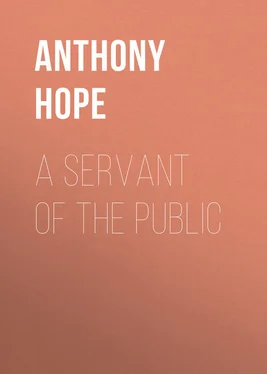Anthony Hope - A Servant of the Public
Здесь есть возможность читать онлайн «Anthony Hope - A Servant of the Public» — ознакомительный отрывок электронной книги совершенно бесплатно, а после прочтения отрывка купить полную версию. В некоторых случаях можно слушать аудио, скачать через торрент в формате fb2 и присутствует краткое содержание. Жанр: foreign_prose, на английском языке. Описание произведения, (предисловие) а так же отзывы посетителей доступны на портале библиотеки ЛибКат.
- Название:A Servant of the Public
- Автор:
- Жанр:
- Год:неизвестен
- ISBN:нет данных
- Рейтинг книги:3 / 5. Голосов: 1
-
Избранное:Добавить в избранное
- Отзывы:
-
Ваша оценка:
- 60
- 1
- 2
- 3
- 4
- 5
A Servant of the Public: краткое содержание, описание и аннотация
Предлагаем к чтению аннотацию, описание, краткое содержание или предисловие (зависит от того, что написал сам автор книги «A Servant of the Public»). Если вы не нашли необходимую информацию о книге — напишите в комментариях, мы постараемся отыскать её.
A Servant of the Public — читать онлайн ознакомительный отрывок
Ниже представлен текст книги, разбитый по страницам. Система сохранения места последней прочитанной страницы, позволяет с удобством читать онлайн бесплатно книгу «A Servant of the Public», без необходимости каждый раз заново искать на чём Вы остановились. Поставьте закладку, и сможете в любой момент перейти на страницу, на которой закончили чтение.
Интервал:
Закладка:
"It's strange," he thought, "that the thing, after dragging on so long, should come to a head now, to-night, just when – ." He broke off his reflexions and, going to the window, looked out on the lights of the bridge and listened to the lessening noise of the town. He was dimly conscious that in this day of long idleness, by the slow low river and in the little inn, he had done more to draw the lines and map the course of his life than in any hour of labour, however successful and however strenuous. Fate had surprised him with a point-blank question, the Stand-and-deliver of a direct choice. Saying he would think it all over, he sat late that night. But thoughts will not always be compelled and disciplined; his vigil was but a pictured repetition of the day that he had lived. The day had been Ora's day. Hers also was the night.
CHAPTER VI
AWAY WITH THE RIBBONS!
Few things make the natural man, a being who still occupies a large apartment in the soul of each of us, more impatient than to find people refusing to conform to his idea of the way in which they ought to seek and find happiness. So far as sane and sensible folk are concerned – there is no need to bring the Asylums into the argument – his way is the way; deviations from it, whether perversely deliberate or instinctive and unreasoned, are so many wanderings from the only right track. He likes money – then only fools omit to strive for it. Stability of mind is his ideal – what more wretched than to be tossed from mood to mood? A regular life is the sole means of preserving health in stomach and brain – it is melancholy to see persons preferring haphazard and ill-regulated existences. Nay, it makes this natural man rather vexed if we do not like his furniture, his favourite vegetable, his dentist, and so forth; his murmured " De gustibus " has a touch of scorn in it. He conceives a grudge against us for upsetting established standards of excellence in matters of life, conduct, upholstery, and the table. Our likings for people in whom he sees nothing puzzle and annoy him equally; the shrug with which he says, of a newly married couple for instance, "They seem very happy," adds quite clearly, "But on no reasonable grounds have they a right to be, and in my heart I can't quite believe they are."
Sir James Muddock – once again the occasion of generalisations – had never been able to understand why Ashley Mead did not jump at the chance of Alice Muddock's hand and a share in Buckingham Palace Road. The lad was poor, his prospects were uncertain, at the best they could not yield wealth as Sir James had learnt to count it; the prejudice against trade is only against trade on a small scale; any ambitions, social or political, would be promoted, not thwarted, by his entry into the firm. As for Alice, she was the best girl in the world, clever, kind, trustworthy; she was very fond of him; he was fond of her and appreciated her company. Ashley was turned thirty; he was not asked to surrender the liberty of early youth. He had had his fling, and to sensible men this fling was a temporary episode, to be enjoyed and done with. It was time for him to get into harness; the harness offered was very handsome, the manger well filled, the treatment all that could be desired. When Sir James summed up the case thus, he had no suspicion of what had passed during one Sunday in the country; it is fair to add that it would have made no difference in his ideas, if he had known of it. The day in the country with Ora Pinsent would have been ticketed as part of the fling and thus relegated to after-dinner memories. Sir James did not understand people to whom the fling was more than an episode, to whom all life went on being a series of flings of ever-changing dice, till at last and only in old age the box fell from paralysed fingers. Therefore he did not understand all that was in the nature of Ashley Mead; he would have understood nothing at all of what was in Ora Pinsent's.
Ashley's decision had taken itself, as it seemed, without any help or effort on his part. Here was the warrant of its inevitability. He thought, when he first read the old man's summons, that he was in for a great struggle and faced with a hard problem, with an anxious weighing of facts and a curious forecast of possibilities, that he must sit down to the scrutiny in idleness and solemnity. But somehow, as he slept or dressed or breakfasted, between glances at his paper and whiffs of his pipe, he decided to refuse many thousands a year and to ignore the implied offer of Alice Muddock's hand. In themselves thousands were good, there was nothing to be said against them; and of Alice he had been so fond and to her so accustomed that for several years back he had considered her as his most likely wife. She and the thousands were now dismissed from his life – both good things, but not good for him. He sighed once with a passing wish that he could be different; but being what he was he felt himself hopelessly at war with Sir James' scheme as a whole, and with every part of it. Contrast it with the moods, the thoughts, the atmosphere of life which had filled his yesterday! And yesterday's was his native air; thus it seemed to him, and he was so infected with this air that he did not ask whether but for yesterday his decision would have been as easy and unfaltering.
The old man was hurt, grieved, and, in spite of previous less direct rebuffs, bitterly disappointed; he had not thought that his offer would be refused when expressly made; he had not looked to see his hints about his daughter more openly ignored the more open they themselves became. His anger expressed itself in an ultimatum; he flung himself back in his elbow chair, saying,
"Well, my lad, for the last time, take it or leave it. If you take it, we'll soon put you through your facings, and then you'll be the best head in the business. But if you won't have it, I must take in somebody else."
"I know, Sir James. Don't think I expect you to go on giving me chances."
"If it's not you, it's got to be Bertie Jewett." Bertie Jewett was Herbert, son of Peter Jewett who had served through all the changes and lately died as Manager in Buckingham Palace Road. "He won't refuse, anyhow." The tone added, "He's not such a fool."
"No, he's not such an ass as I am," said Ashley, answering the tone and smiling at poor Sir James with an appealing friendliness.
"That's your word, not mine; but I'm not going to quarrel with it," said Sir James without a sign of softening. "What you're after I can't see. What do you want?"
Ashley found himself unable to tell the Head of the Firm what he wanted.
"I can get along," he said lamely. "I make a bit writing for the papers, and there's a brief once in a blue moon; and of course I've got a little; and this secretaryship helps for the time."
This beggarly catalogue of inadequate means increased Sir James' scorn and bewilderment.
"Are you above it?" he asked with sudden heat.
"Good God, sir, don't think me a snob as well as an ass," prayed Ashley.
"Then I don't know what you do want."
Matters seemed to have reached a standstill. But Sir James had a last shot in his locker.
"Go up and lunch in Kensington Palace Gardens," he said. "Talk it over with the ladies, talk it over with Alice."
Ashley wanted to refuse; on this day he had no desire to see Alice. But refusal seemed impossible.
"All right, Sir James, I will," he said.
"Take a week, take a week more. If you say no then, it's Bertie Jewett – and your chance is gone for ever. For Heaven's sake don't make a fool of yourself." Affection mingling with wrath in the entreaty made it harder to resist.
Ashley walked off with the last words ringing in his ears; they recalled Lord Bowdon and the Athenæum corner. After reflexion and against inclination Bowdon had determined not to make a fool of himself, and had intrenched his resolution with apparent security against the possibility of a relapse into a less sensible course. Here was Ashley's example; but he shied at it.
Читать дальшеИнтервал:
Закладка:
Похожие книги на «A Servant of the Public»
Представляем Вашему вниманию похожие книги на «A Servant of the Public» списком для выбора. Мы отобрали схожую по названию и смыслу литературу в надежде предоставить читателям больше вариантов отыскать новые, интересные, ещё непрочитанные произведения.
Обсуждение, отзывы о книге «A Servant of the Public» и просто собственные мнения читателей. Оставьте ваши комментарии, напишите, что Вы думаете о произведении, его смысле или главных героях. Укажите что конкретно понравилось, а что нет, и почему Вы так считаете.












